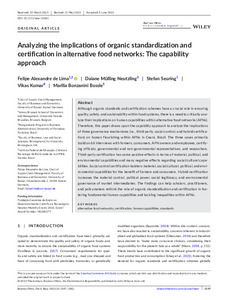| dc.date.accessioned | 2023-10-06T12:41:03Z | |
| dc.date.available | 2023-10-06T12:41:03Z | |
| dc.date.issued | 2023-06-14 | |
| dc.identifier | doi:10.17170/kobra-202309218795 | |
| dc.identifier.uri | http://hdl.handle.net/123456789/15104 | |
| dc.description.sponsorship | Gefördert im Rahmen des Projekts DEAL | ger |
| dc.language.iso | eng | |
| dc.rights | Namensnennung 4.0 International | * |
| dc.rights.uri | http://creativecommons.org/licenses/by/4.0/ | * |
| dc.subject | alternative food networks | eng |
| dc.subject | certification | eng |
| dc.subject | human capabilities | eng |
| dc.subject | standards | eng |
| dc.subject.ddc | 330 | |
| dc.title | Analyzing the implications of organic standardization and certification in alternative food networks: The capability approach | eng |
| dc.type | Aufsatz | |
| dcterms.abstract | Although organic standards and certification schemes have a crucial role in ensuring quality, safety, and sustainability within food systems, there is a need to critically analyze their implications on human capabilities within alternative food networks (AFNs). Therefore, this paper draws upon the capability approach to analyze the implications of three governance mechanisms (i.e., third-party, social control, and hybrid certification) on human flourishing within AFNs in Ceará, Brazil. The three cases primarily build on 66 interviews with farmers, consumers, AFN owners and employees, certifying officials, governmental and non-governmental representatives, and researchers. Third-party certification has some positive effects in terms of material, political, and environmental capabilities and many negative effects regarding social/cultural capabilities. Social control certification bolsters material, social/cultural, political, and environmental capabilities for the benefit of farmers and consumers. Hybrid certification increases the material control, political power, social legitimacy, and environmental governance of market intermediaries. The findings can help scholars, practitioners, and policymakers rethink the role of organic standardization and certification in fostering fundamental human capabilities and tackling inequalities within AFNs. | eng |
| dcterms.accessRights | open access | |
| dcterms.creator | Alexandre de Lima, Felipe | |
| dcterms.creator | Mülling Neutzling, Daiane | |
| dcterms.creator | Seuring, Stefan | |
| dcterms.creator | Kumar, Vikas | |
| dcterms.creator | Bossle, Marilia Bonzanini | |
| dc.relation.doi | doi:10.1111/beer.12561 | |
| dc.relation.projectid | NG160177 | |
| dc.subject.swd | Biologisches Lebensmittel | ger |
| dc.subject.swd | Zertifizierung | ger |
| dc.subject.swd | Standardisierung | ger |
| dc.subject.swd | Nachhaltigkeit | ger |
| dc.subject.swd | Capability Approach | ger |
| dc.type.version | publishedVersion | |
| dcterms.source.identifier | eissn:2694-6424 | |
| dcterms.source.issue | Issue 4 | |
| dcterms.source.journal | Business Ethics, the Environment and Responsibility | eng |
| dcterms.source.pageinfo | 1547-1562 | |
| dcterms.source.volume | Volume 32 | |
| kup.iskup | false | |


